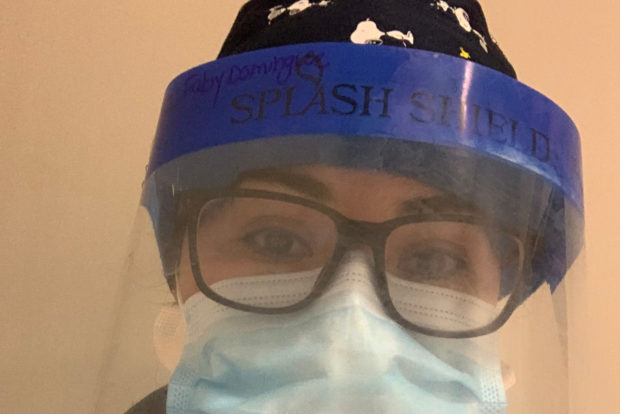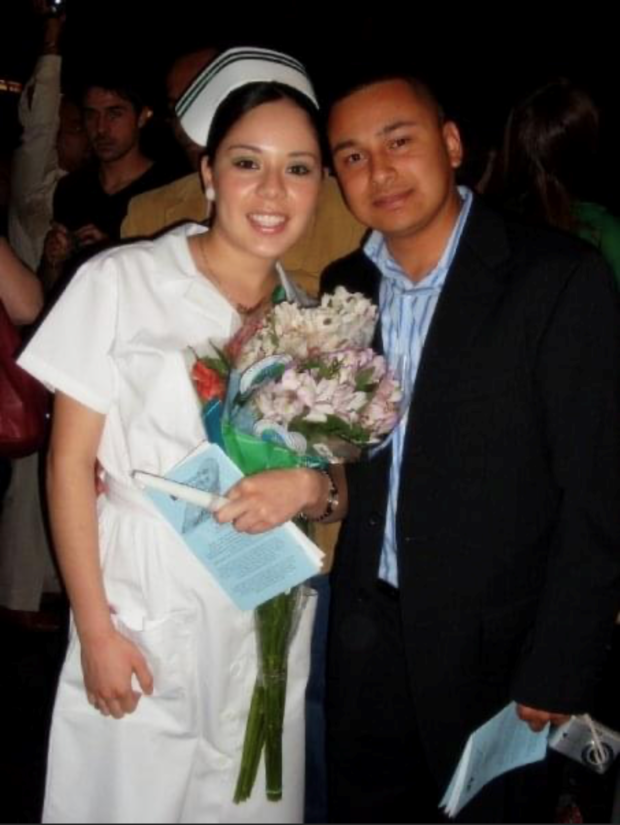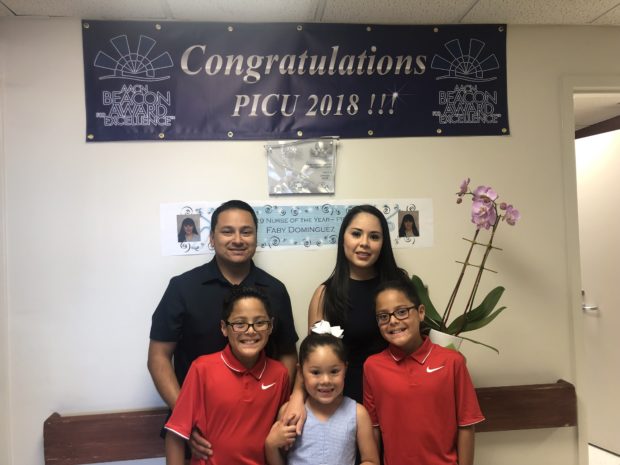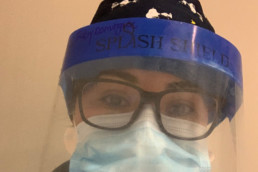“DACA is my lifeline”
As published in Columbia Journalism
“DACA is my lifeline”
Eric Fan

Fabiola Dominguez felt she did not have a choice when the Baptist Hospital in Miami shut down its Children’s branch. She had worked as a pediatric nurse for her entire career, until last April. She was told to treat adult patients, or there would be no work for her at all.
“There was no more Children’s Hospital,” she said.
Together with many of her colleagues, Dominguez was suddenly transferred to the hospital’s adult Intensive Care Unit, when a surge of COVID-19 patients was expected to overwhelm the unit’s capacity. Training for the intensive care unit would usually take six months, according to Dominguez, but she received a crash course for just under six weeks.
“I’m used to my patients being about this big,” Dominguez, 33, said on a Zoom call as she gestured to the size of a little baby, “Now I’m dealing with 300-pound men.”
Dominguez expected a pandemic to be hard, but she could not imagine what was to come.
“I’ve never watched so many people die, every single day,” she said, recounting that the morale in her unit quickly turned from an initial fear to solidarity, and eventually, to exhaustion. “It was Code Blue every single day.”
Code Blue is a medical emergency, such as cardiac or respiratory arrest, and ICU nurses like Dominguez are the first responders.
“You are running from code to code,” she recalled. “There were some days when we did not stop.”
At the height of the pandemic, Dominguez worked 12-hour shifts during the night, sometimes seven days a week. She would cover her face with a high-filtration respirator at 7 P.M. and not take it off for the entire night.
On some days, Dominguez would cry in her car before stepping into the hospital. As much as she tried to keep the pressure to herself, her husband noticed a difference.
“I felt bad for her,” said Edwin Dominguez, who works as an officer at the Miami-Dade Police Department. “At least I can stay six feet apart in the open. She’s right there with people who you know have it.”
The story of Fabiola Dominguez is a nurse’s American dream met with a global pandemic. She is a proud police wife, and a mother of three. She is also a Mexican immigrant, brought here undocumented when she was six and has been allowed to stay in the country through the Deferred Action for Childhood Arrivals program, commonly known as DACA.
Dominguez would later leave the Baptist Hospital she had worked for a decade and find a way back to the pediatric world that was her first love. Her 7-month experience at the adult ICU took a toll, but she had no regrets. “I honestly would not give it back.”
As one of the largest hospital systems in the Miami area with 700 beds, Baptist Health South Florida was well-equipped, at least in early April, when nurses wore full medical gowns and N-99 masks. To Dominguez, her biggest concern was for her family.
“You are fighting something you don’t know,” she said. “I have kids. My sons are asthmatic and my biggest fear was to bring it home.”
Nobody knew how deadly the pandemic would turn out to be, but having worked in a pediatric ICU for years, Dominguez was familiar with death and dying. Many of her colleagues would never work in a pediatric unit, she said, because it was too heart-breaking to see kids on their dying beds.
“Nursing is a calling,” she likes to say. “You have to love this career to do it.”
Because COVID-19 was still not fully understood, families were barred from the ICU even when a patient was about to die. That left Dominguez and her colleagues the last people that patients saw at the end of their lives. One of her patients, an older Black male, reminded Dominguez of her stepfather.
“If my dad was lying on this bed, how would I want another nurse to take care of my dad?” she remembered thinking. “I made sure I was there for them. I made sure they are well taken care of in their last moments.”
The outbreak started slowly in Miami. By late April, hope seemed to be on the horizon. New cases in Miami-Dade County dropped from an initial 500 to about 200 each day. Inside the hospital, many were hopeful that they would soon overcome the virus.
“It went from this fear of the unknown, to ‘we got each other’s back and we’re gonna do it,’” she said.
But that optimism did not last long. Florida Governor Ron DeSantis lifted the state’s stay-at-home order in May, and allowed beaches and hotels to reopen. By June, COVID cases in Miami started rising again, and it soon skyrocketed to more than 3,000 each day.
Inside the ICU, Dominguez and her colleagues were caught off-guard. Despite shutting down the Children’s branch and pulling all of its resources for COVID patients, the hospital ran out of beds. There were also not enough protective gowns. Dominguez remembered wearing a thick, heavy plastic outfit, constantly sweating, while performing CPR on her patients.
“We were beaten emotionally, physically,” she said of the exhaustion among her colleagues, “because we were so short-staffed.”
This time, patients arriving at the ICU were also a lot younger, many in their 30s and 40s. One of her patients was a 37-year-old police officer, whose condition got so bad that the nurses had to intubate him.
“My husband is a cop,” Dominguez remembered saying to herself, “oh my god, my husband is 35.”
While Dominguez was taking care of others in the ICU, her husband confronted anti-police protestors on the street. As both a Mexican immigrant and a proud police wife, Dominguez had mixed feelings about the protests.
“My husband is Mexican American. He became a cop to help people,” she said. “We were stuck in the middle.”
Sometimes, Dominguez would simply turn off the news and ignore controversies about police officers. But there was not an easy switch to turn off COVID-19.
One day, Dominguez noticed a medical transporter walking in with a stretcher that looked unusual. “Hey, you got a new stretcher?” she asked, not realizing that the stretcher was going to a fridge.
“No,” the transporter answered, “we ran out of room in the morgue.”
Fear, exhaustion, and a sense of helplessness were painfully common among those on the frontline battling COVID. A recent Washington Post-Kaiser Family Foundation poll found that, across the country, “6 in 10 health-care workers say their mental health suffered from coronavirus worry.” The rate is even higher for those who are under 40 years old.
The breaking point for Dominguez came when she had to comfort a woman’s son outside the ICU room, while refusing to let him in.
“You are telling her son that your mother is dying but you can’t come,” she recalled. “I was holding this lady for two hours until she died. I walked out of there, numb. I called my mom and said I can’t do this anymore.”
She did not want to leave her coworkers, whom she had worked with for many years. She briefly transferred to a mother-baby unit, where she cared for the newborns and their mothers. It was much less intense, but not what she wanted.
“If you talk to any ICU nurses, mother-baby is not the place for them,” she said with a grin. “We are adrenaline junkies.”
Last October, Dominguez accepted an offer from the Holtz Children Hospital to work in its pediatric ICU. It was a 1.5-hour commute from her home in Homestead, but she was happy.
“When you have passion for something, you do it.”
Dominguez did not grow up wanting to become a nurse. It was the wish of her mother, who was studying to become a nurse in Mexico but was never able to finish.
In 1994, Dominguez’s mother brought her two daughters across the border, fleeing domestic violence from their father when Dominguez was six years old. Even though she was undocumented, her mother wouldn’t allow her to cut school.
Without a proper government ID, Dominguez knew that she was different. But “mom always says that we come here for the American dream and the way to achieve that is through education,” Dominguez said.
Dominguez was a good student. In her junior year at the South Dade Senior High School, she took a Nurse Assistant Training course. She was initially reluctant, being “stuffed” into an operation room to watch a C-section.
“I was scared out of my mind. I said to myself: ‘Oh God, please let me not pass out.’”
She did not. Instead, it became an eye-opening moment.
“It was the most amazing experience,” she remembered. “I got to see a baby being born. I said, that’s it, I am going to be a nurse!”
 After high school, Dominguez was already a certified nursing assistant and knew that she wanted a nursing degree from college. But despite her near-perfect high school GPA, she did not even apply. As an undocumented student, Dominguez did not qualify for in-state tuition discounts. The out-of-state cost was $6,000 and her mother’s housekeeper wages could not afford it.
After high school, Dominguez was already a certified nursing assistant and knew that she wanted a nursing degree from college. But despite her near-perfect high school GPA, she did not even apply. As an undocumented student, Dominguez did not qualify for in-state tuition discounts. The out-of-state cost was $6,000 and her mother’s housekeeper wages could not afford it.
“What am I supposed to do with the rest of my life?” the 17-year-old told the Tampa Bay Times in 2006. “Work as a housekeeper? Pick beans in the fields?”
Fortunately, her mother’s remarriage to an American citizen made Dominguez an in-state student the next year. She then studied nursing at the Miami Dade College and there she became the student president.
While pursuing her bachelor’s degree, Dominguez was hired by her high school teacher who opened a care facility for specialty children. But without documentation, Dominguez still could not work at a hospital, until the DACA program finally gave her a work permit.
“We’ve been undocumented for a long time,” she said, “until President Obama brought in DACA. That’s when everything changed for me.”
Seven years later, just as Dominguez was on the frontline battling COVID-19, the Trump administration sued to repeal DACA. She was scared.
“DACA is my lifeline,” she said. “If DACA tomorrow disappears, I can’t go to work, my driver’s license gets invalid, my children lose their health insurance.”
The Dominguez’s could not have made mortgage and car payments with only her husband’s wages.
Edwin Dominguez, also undocumented when he crossed the border as a child, is now an American citizen. The two married in 2016, but strict immigration rules prevented him from petitioning for his wife.
“I wish it was that easy,” he chuckled. “Trust me — we would have done that a long time ago.”
When the Supreme Court ruled against the Trump administration last June, Dominguez was overjoyed. She posted on Facebook: “Thanks Jesus!”
Now a registered nurse, Dominguez can finally pay for her own education, even though her legal status still prevents her from receiving financial aid. She is enrolled in the Florida International University, where she will finish her master’s and become a pediatric nurse practitioner in August.
Dominguez has big dreams. She wants to eventually get a doctoral degree, open her own practice, and train the next generation of nurses.
 “We live in a community where we lack role models.” Dominguez remembered speaking at a local daycare center where many immigrant families kept their children. She and her husband were the only parents invited for a career talk.
“We live in a community where we lack role models.” Dominguez remembered speaking at a local daycare center where many immigrant families kept their children. She and her husband were the only parents invited for a career talk.
“When I walked in, it was just me and him,” she recalled. The owner explained to them that most of the kids’ parents worked as laborers on farms.
While talking about gun safety, Dominguez’s husband said something in Spanish. One little boy shouted out with surprise: “You speak Spanish!”
“Yeah, I’m Mexican!” he answered.
It is rare to find someone with a doctoral degree in Dominguez’s community. “To me, it’s trying to become somebody’s role model,” she said. “I’m an immigrant. I’m Mexican. But I’m also educated.”

